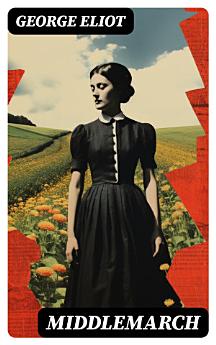Middlemarch
Nov 2023 · DigiCat
4.0star
1 reviewreport
Ebook
577
Pages
family_home
Eligible
info
reportRatings and reviews aren’t verified Learn More
About this ebook
Set against the backdrop of a fictional Midlands town during the early 19th century, "Middlemarch" is a multi-layered exploration of the complexities of human relationships, social change, and the subtleties of character. George Eliot employs a rich, narrative style marked by keen psychological insight and detailed descriptions, weaving together the lives of various characters such as Dorothea Brooke and Tertius Lydgate. The novel is notable for its critical examination of the issues of its time, including the role of women in society and the tensions between idealism and pragmatism, making it a pivotal work in the canon of Victorian literature. George Eliot, the pen name of Mary Ann Evans, was a trailblazing novelist and social thinker whose own tumultuous experiences shaped her understanding of human nature and societal constraints. Growing up in a rural environment and influenced by her extensive knowledge of philosophy and literature, Eliot's perspectives on gender, intellectual freedom, and personal aspiration deeply inform the narrative and character development in "Middlemarch". Her commitment to portraying authentic female experiences in a patriarchal society delivers a profound commentary on the limitations placed upon women. "Middlemarch" is not merely a novel; it is an intellectual feast that invites readers to reflect on the intricacies of life and society. Highly recommended for those interested in character-driven narratives and the interplay of personal and political realms, Eliot's masterpiece remains a significant touchstone for discussions on social reform, self-identity, and the enduring quest for fulfillment.
Ratings and reviews
4.0
1 review
About the author
George Eliot, the pen name of Mary Ann Evans (1819-1880), stands as one of the preeminent figures of Victorian literature. Born in Nuneaton, Warwickshire, England, her decision to adopt a masculine pseudonym was propelled by the desire to ensure her works were taken seriously in a male-dominated literary environment and to escape the stereotyping of female authors as writers of only lighthearted romances. Eliot's novels are hailed for their realism, psychological insight, and detailed depiction of the rural society she grew up in. 'Middlemarch,' perhaps her most celebrated work, epitomizes these qualities. Published in 1871-72, the novel presents a rich tapestry of characters and stories that converge to create a portrait of life in a provincial English town. Eliot's astute narrative and incisive character analyses explore themes such as the status of women, the nature of marriage, idealism, self-interest, religion, hypocrisy, political reform, and education. Her intellectual rigor and moral seriousness have made her an enduring figure in literature, influencing writers and critics alike. Acclaimed for its ambition and scope, 'Middlemarch' has often been cited as one of the greatest novels in the English language. By transcending the confines of her era, George Eliot has secured perennial relevance in the study of human nature and social dynamics.
Rate this ebook
Tell us what you think.
Reading information
Smartphones and tablets
Install the Google Play Books app for Android and iPad/iPhone. It syncs automatically with your account and allows you to read online or offline wherever you are.
Laptops and computers
You can listen to audiobooks purchased on Google Play using your computer's web browser.
eReaders and other devices
To read on e-ink devices like Kobo eReaders, you'll need to download a file and transfer it to your device. Follow the detailed Help Center instructions to transfer the files to supported eReaders.








